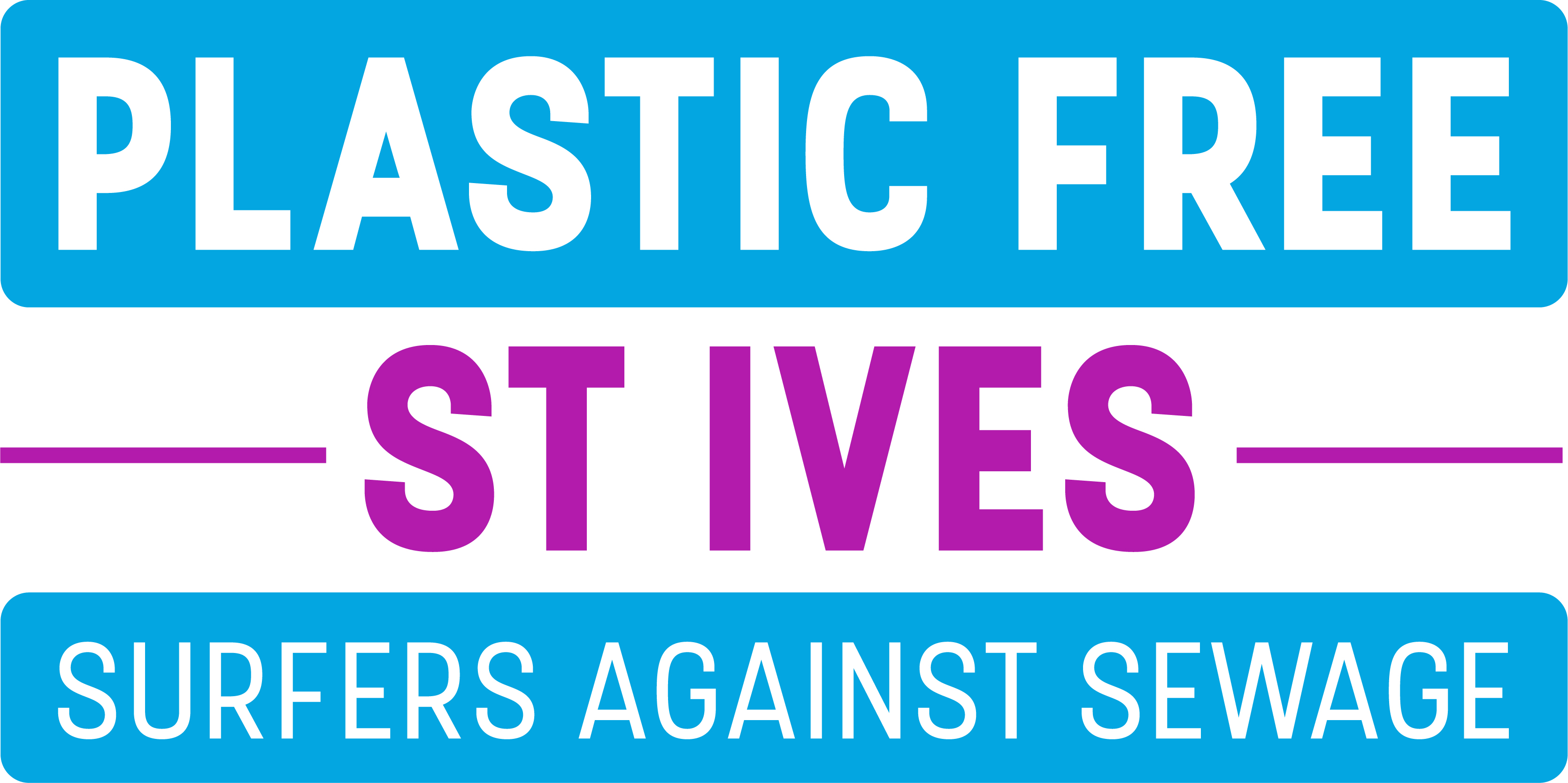Recycling Plastic #knowledgeispower
November 26th, 2018
Plastic is one of the most popular and useful materials of modern times: we now use about 20 times more plastic than we did 50 years ago.
Say ‘No’ to plastic
As with any commodity, the proper way to deal with the over-consumption of plastic is to minimise the use of it:
- to say no when offered a plastic item
- to turn down the plastic bags
- to buy loose items over packaged items
- to use reusable water bottles
- to use ethically minded businesses who minimise their own use of plastic
Reduction is the key. The mantra that many Plastic Free Communities use is REDUCE, REUSE, REFUSE, RECYCLE – with recycling being the last resort. However plastic’s popularity and widespread use is why handling it responsibly and correctly once it becomes waste is so vitally important. We can optimise the lifespan of plastics by re-using and recycling items as many times as possible.
The plastic knowledge gap
There is still a knowledge gap between the general public and plastic and plastic recycling, key ones being…
- Types of plastic and what plastics can and cannot be recycled – are you clear on this?
- What is ‘valuable’ plastic and what is ‘contaminating’ plastic?
While the Government is looking to address issues around consistency of recycling practices it doesn’t help that recycling methods across local authorities are fragmented, with many local authorities establishing a different set of rules.
Currently 99% of all UK local authorities offer recycling facilities for plastic bottles with 79% of councils collecting other rigid plastic packaging such as pots, tubs and trays [1].
[1] https://www.bbc.co.uk/news/science-environment-45496884
Plastic – the basics
There are many different types of plastic and most plastic items will have a plastic code stamped on it somewhere. Here is a table showing the different types of plastic identification codes and general uses:
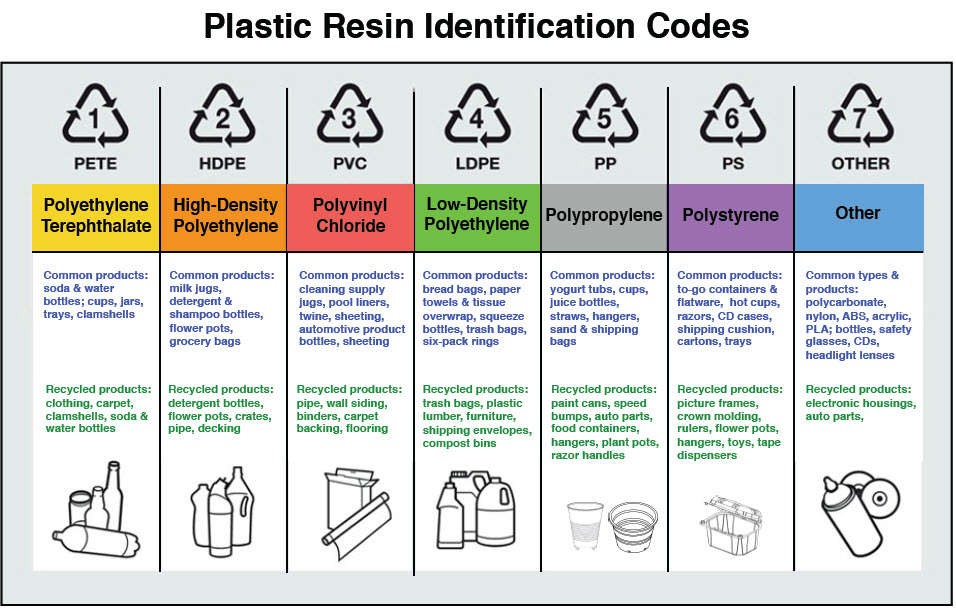
Economics of plastic
All plastic can be recycled – but it is just not always economical to do so.
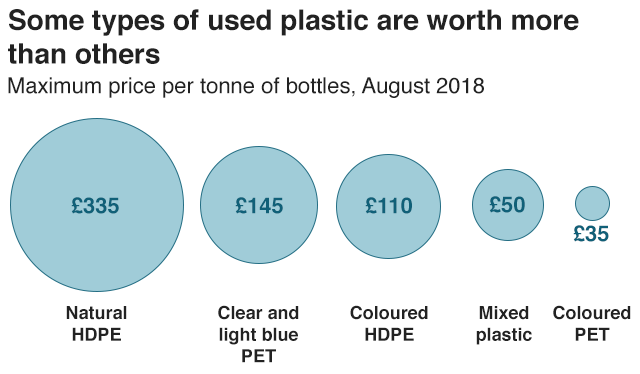
Bottles attract the best prices, especially clear ones, which is why almost all councils recycle them. Coloured plastic is less desirable because the colour cannot be removed restricting its reusability and polystyrene is almost never recycled because there is no market for it [2]
Most bottles will be sent for reprocessing in this country but plastic that is less valuable – about two-thirds collected for recycling – goes overseas and this figure has been rising.
[2] https://www.bbc.co.uk/news/science-environment-45496884
Recycling plastic
Every year we buy around 3.7 million tonnes of plastic products in the UK: Much of this plastic is packaging, with only 842,000 tonnes being recycled.
Much of the plastic we use ends up in landfill or incinerated. This is either because it is currently not possible to recycle, individuals don’t take it to be recycled or local authorities don’t accept it.
Plastics can also often become too contaminated for recycling and have to, again, be sent to landfill or incinerated. This happens for several reasons:
- People are confused about what goes in which bin
- People are not always very careful about what they put in
- The plastic is contaminated with food waste
- In areas where all recycling is collected in one bin, one type of waste can contaminate another
As mentioned there are seven different plastic identification codes and some are recycled more often than others.
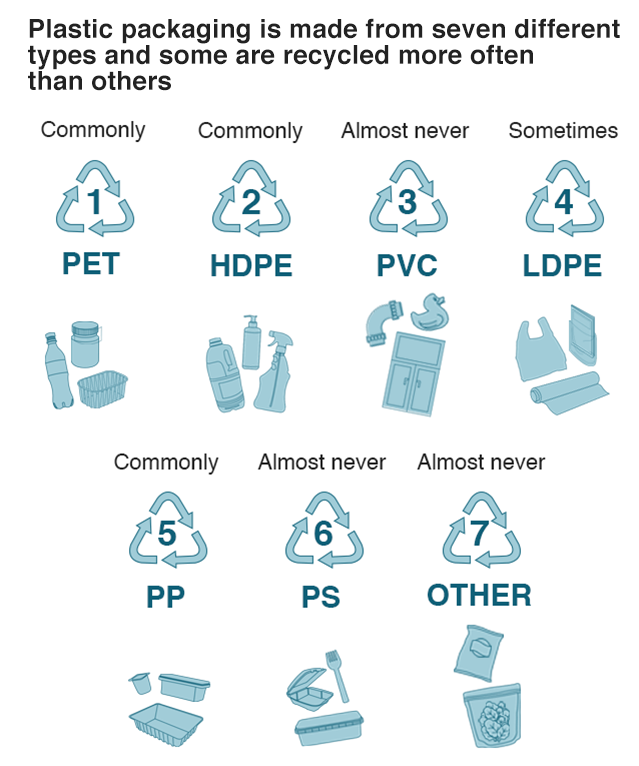
- Bottles are mainly made of PET (1) and HDPE (2)and these are easy to collect and recycle
- Most trays are made from polypropylene (5) and this is pretty easy to recycle too but not all councils have access to the right facilities
- LDPE (4) used to make some carrier bags and cling film, is easy to process but more difficult to sort and can often be contaminated with food
- PVC (3) makes up small amount of packaging but can contaminate other plastic recycling
- Polystyrene (6) used to make some yoghurt pots and plastic cutlery, is not widely recycled
- Biscuit wrappers and meat trays can be made from a mixture of many different types of plastic, making them the most difficult type of packaging to recycle (7)[3]
[3] https://www.bbc.co.uk/news/science-environment-45496884
Plastic – when to recycle
Yes, recycle these…
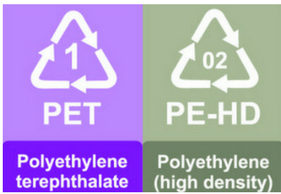
Recycling codes #1 and #2 are the most widely accepted. Recycling centres have the equipment to process these plastics, and there are plenty of manufacturers willing to buy them.[4]
Where you’ll find them:
- #1: Soft drink bottles, water bottles, peanut butter jars, salad dressing, cooking oil, many cleaning products.
- #2: Milk and juice jugs, bleach, laundry detergent, shampoo, motor oil, some retail bags and trash bags, some yogurt and butter tubs, cereal box liners.
These plastics are recycled into new plastic containers, tote bags, fleece clothing, carpet, furniture, panelling, pips, lumber, benches, fencing, dog houses and picnic tables.
[4] https://greenopedia.com/plastic-recycling-codes/
Often recyclable, but not always…
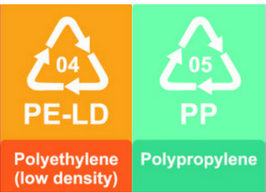
Give your local facility a call to see if they accept these plastics. They are becoming more commonly accepted as technology improves and as the market for these plastics grows.
Where you’ll find them:
- #1 (soft): Food take-out containers, microwaveable trays and plastic cups.
- #4: Most grocery store bags, plastic wraps, frozen food bags, bread bags, 6-pack rings, squeezable bottles, aseptic packaging.
- #5: Yogurt containers, straws, fast-food syrup containers, disposable diapers, disposable cups and plates, ketchup squeeze bottles, some baby bottles and outdoor carpet.
These plastics are recycled into things like plastic lumber, floor tile, trash cans and liners, compost bins, shipping envelopes, plastic brooms, rakes, trays, hair brushes, ice scrapers, bike racks, battery cables and signal lights.
Almost never recyclable, but do check…

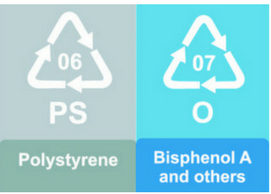
It is difficult to recycle these plastics into other products or, in some cases, it is just not economically feasible to do so. Still, do check with your local recycling facility because some cities do accept one or more of these codes and as technology improves, more cities will do so.
Contamination of plastic
Some plastics can contaminate the recycling stream. Most food packaging and other plastics are stamped with a recycling symbol, even if they are often not accepted for recycling.
The problem is that if we throw non-recyclable plastics into the recycling bin, they can contaminate the entire recycling stream. Manufacturers who buy the recycled plastic will pay less for contaminated plastics, or they won’t buy them at all.
Just like any other business, recycling facilities operate on sales revenue. Low quality plastics sell for lower prices, and that lower revenue makes it harder for the recycler to provide us with their invaluable service.[5]
[5] https://greenopedia.com/plastic-recycling-codes
What can we recycle in Cornwall?
Cornwall can now recycle the majority of plastics as pots, tubs and trays. All the plastics collected are sent to a Materials Recycling Facility at either Bodmin or Pool and are then sent on to UK re-processing plants where they can be made into other products such as furniture, drainage pipes or fleeces.[6]
Tips for recycling tips for pots, tubs and trays
- Pots, tubs and trays go in the same bag as plastic bottles
- Unfortunately black plastic cannot currently be recycled as the machinery that sorts the plastic by colour cannot see black
- Please rinse and squash pots, tubs and trays before putting them out for recycling
You’d be surprised at what you can recycle in Cornwall now. To name a few which you may be surprised about: bottle tops, coffee cup lids, noodle pots, sweet tubs and face cream pots!
See this link for what plastic pots, tubs and trays you can or cannot put in the recycling bags www.cornwall.gov.uk/media/28556127/plastics-recycling-poster-web.pdf
[6] https://www.cornwall.gov.uk/council-and-democracy/council-news-room/media-releases/news-from-2017/news-from-november-2017/pots-tubs-and-trays-plastic-recycling-now-available-across-the-whole-of-cornwall/
Spread the word
If you’re confused about it all then other people will be too! However, it’s too important an issue for confusion to be an acceptable reason not to recycle. Share your experiences, promote the importance of recycling in your every day conversations. It’s a sad fact that less than 50% of household items that can be recyled actually are recycled. We want to put pressure on the government to do their bit but that must be backed up by us doing ours!
Going plastic free at Cohort Hostel
This is what we’re doing… https://www.stayatcohort.co.uk/skip-the-plastic/
This is what the town is doing… https://www.stayatcohort.co.uk/2018/11/13/st-ives-is-going-plastic-free/
Join us!
Photo by Mali Maeder from Pexels

